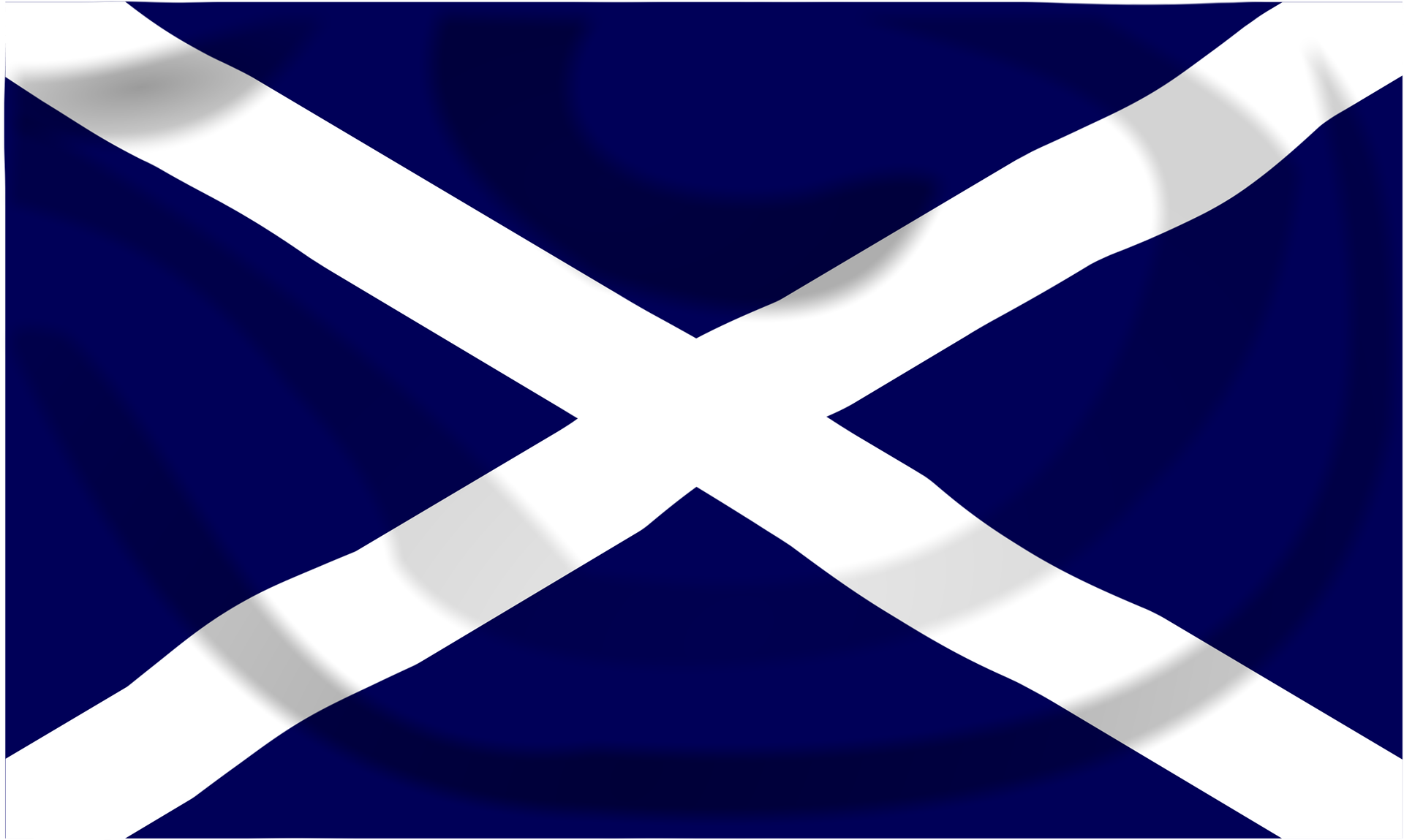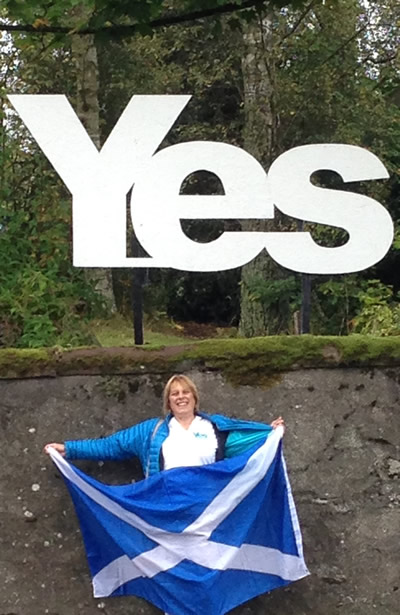
Happy Day – 18th September 2014. My ‘I’ve just voted for Independence’ photograph.
Why should Scotland be independent?
In summer 2021 Scotland’s Independence supporting newspaper The National ran an essay competition. The brief was to write a ‘Yessay’ (Max 2,200 words) under the title ‘Why Should Scotland be Independent?’ that would aim to persuade an uncertain Yes voter to become an actual Yes voter. This is my entry. I didn’t win but I still think my essay is great and worth sharing. See what you think?
Why should Scotland be independent?
Our resident agony aunt has been dealing with a heart-breaking but all too common case this week.
Dear Relationship Counsellor, I think I may be in an abusive relationship.
My partner takes most of my money and only gives me some spending money back. They make all the big decisions about our life together without asking what I want, and they decide who I can talk to and how in the outside world. They tell me it is for my own protection, but I am beginning to think that their idea of protection is more for them than for me.
They do ask my opinion on things once every few years but then they tell me that it is stupid and worthless, and they do the opposite of what I wanted. The rest of the time they just tell me to shut up.
Occasionally, if I say I am fed up and threaten to leave, they buy me some cheap flowers from the garage forecourt and tell me that they love me. But I am beginning to feel like I have been used and that I should find a way to start a new life.
What do you think?
Scotland
Dear Scotland,
This sounds like a classic case of coercive control. You are not being treated with respect, your contribution to the relationship is undervalued and you are being gaslighted on a regular basis. The other party only tries to love-bomb you when you take a stand but, otherwise they are neglectful, manipulative and sometimes downright mean.
This is most certainly an abusive relationship, and you need to find the courage to get away from it. I am not saying it will be easy, but you could look forward to a much better life and freedom to decide how you want your relationships to be in the future. I can recommend some organisations that you can go to for help and support as you make this transition, such as The Scottish National Party, The Scottish Green Party, Women for Independence and All Under One Banner. They have considerable experience in supporting people towards Independence. You could also read The National newspaper which will show you that you are not alone and that other people such as the Catalans share your plight and are also trying to get away from domineering partners.
Your situation is unhealthy and potentially dangerous.
I hope you will take my advice and look forward to a brighter future.
Best wishes,
Your relationship counsellor.
Why should Scotland be Independent?
Well, How no? As they say, in my neck o’ the woods.
Every other self-respecting country in the world aspires to be independent and most have achieved that. The desire for independence is not some weird quirk. Independence is normal. Countries are not lining up to subjugate themselves in unequal unions with other countries and especially with those who are known to throw their weight around. On the contrary, the last hundred years have seen scores of countries throw off the yoke of exploitative colonial regimes. None of them are volunteering to go back to their previous subservience.
Going for independence is so that countries can have control over their political and economic futures. Currently, Scotland cedes much of that control to the government in Westminster. Even with the best will in the world (and there is significant evidence that good will is not their principal driving force), they tend to be focused on issues affecting those closest to them. They do not well understand our geography, our economy, our society, our culture and even our weather. That is how the system is set up. It does not favour Scotland, and it never has. For example, Scotland has not voted for a Conservative government since the nineteen-fifties and yet we have been regularly subject to their rule since. Scotland needs independence so that we can determine our own affairs, hold our own politicians to account and ensure that they work in our interests.
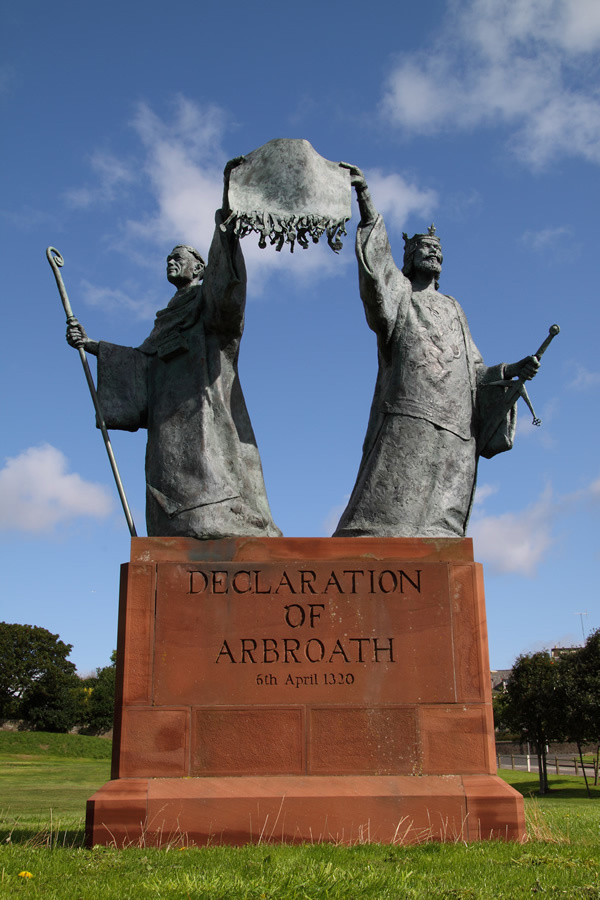 The Declaration of Arbroath - Scotland’s successful claim of Independence in 1320
The Declaration of Arbroath - Scotland’s successful claim of Independence in 1320
But my favourite reasons for wanting independence are social, cultural, and psychological. I contend that playing second fiddle to our Southern neighbour instead of being able to conduct our own affairs has detrimental effects on our national psyche. Like it or not, our sense of ourselves as a people is, at least in part, determined by our relationship with England. Their cultural hegemony means that we are encouraged to swallow narratives about ourselves (and them) that are designed for an audience that is not us. We have seen examples of this recently in the commentating on England’s Euro 2020 football matches that make it clear that British broadcasting is English broadcasting by English pundits about English interests and for English consumption. And we can forgive many of our folk for knowing more about 1066, 1966 and Henry the 8th than they do about 1314, 1967 and William the Lion, because under the auspices of British cultural bulldozing, that is what they get subjected to. These are just the overt tip of an enormous cultural iceberg. And it is not good for our sense of ourselves. We need independence to have the mental space to find out who we are and who we want to be on our own terms. Only then can we go to our neighbours and offer a hand of friendship based on mutual respect.
For over three hundred years our sovereignty has been compromised. We have existed in a schizophrenic world where we are neither quintessentially British nor fully free Scots. Where we have some freedom of movement in law and education, we have successfully ploughed our own furrow. Where we do not, in the economy, in public broadcasting and international relations, we have suffered from having another country’s decisions imposed upon us. The recent Brexit vote is a case in point.
But could we make it on our own?
Could our people, like others across the globe, form the basis for a successful independent country?
Back in medieval times we were represented abroad by two of the greatest polymaths of their times – Duns Scotus and Michael Scot – the clue is in the names. Subsequently we have led the world in many fields: John Napier’s logarithms; Adam Smith’s political economy; James Hutton’s Geology. Mary Somerville, in astronomy, mathematics and science-writing was the first person called a ‘scientist’. James Clerk Maxwell’s magisterial mathematical physics laid the groundwork for Einstein’s theories.
Many of our people had to make their way to other parts of the globe to secure a living or to save their skins. In the eighteenth century after the killing field of Culloden, many were hounded out of Scotland by the brutal and vengeful Hanoverian regime. Others were, notoriously, cleared from the land to be supplanted with, first, sheep and second, hunting estates. Some could barely scrape a living either on paltry coastal land or in our cotton, jute and linen sweatshops and went to try their luck on new shores. Many of us have near relatives who, seeing little on offer for their futures here, decamped to Australia, Canada, New Zealand and other far-flung places. Hell, in large part, we built those places.1With apologies to the First Nations who were often trodden upon in the process.
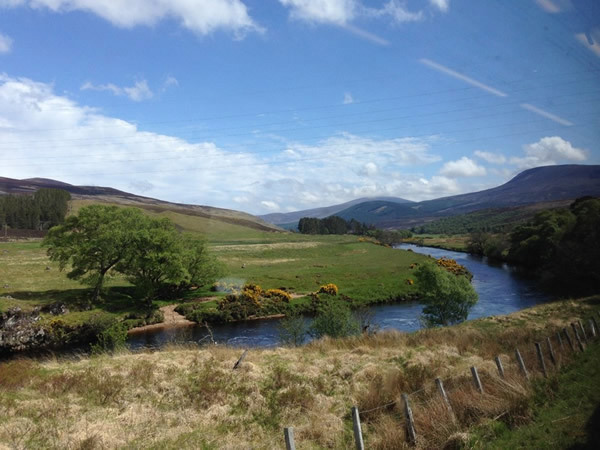 The Strath of Kildonan – beautiful but empty.
The Strath of Kildonan – beautiful but empty.
Imagine if those souls and their endeavour had been allowed to flourish in Scotland and to use their undoubted skills and strength to build our nation. Their industry and ingenuity were hampered by the greed of landlords, the profiteering of industrialists and the machinations of governments who were at best neglectful and at worst genocidal.
Even without these scattered Scots, we managed to build the longest span bridge in the world over the Forth in 1890. We produced the Stevensons, renowned for their jaw-dropping lighthouses, Thomas Telford who pioneered bridges and canals all over the UK, John Logie Baird’s television and Alexander Graham Bell’s telephone. Glasgow led the world in shipbuilding. James Simpson pioneered anaesthesia and Alexander Fleming paved the way for antibiotics.
Imagine how much more we might have done if we had not been subject to an economic and political system that was so designed that it sent huge numbers of our people out of the country and depopulated vast areas of the land.
Imagine too, what further heights might have been achieved by our cultural creatives, if we had had support comparable to our English associates. Among writers we have produced internationally renowned heavy weights like Burns whose Auld Lang Syne is sung all over the world, Walter Scott whose romantic novels like Ivanhoe and Rob Roy have been made and remade by Hollywood and Arthur Conan Doyle whose Sherlock Holmes stories are rarely off tv schedules. Add to them Robert Louis Stevenson and Muriel Spark, Naomi Mitchison, Lewis Grassick Gibbon and Neil Gunn. More recently we have acclaimed bodies of work by Jackie Kay, James Robertson, Val McDiarmid, Ian Rankin, Irvine Welsh and Ali Smith. We have Douglas Stuart running off, justifiably, with the most recent Booker Prize for his stunning debut novel Shuggie Bain. And a recent Costa Debut Novel Award for Gail Honeyman’s Eleanor Oliphant is Completely Fine.
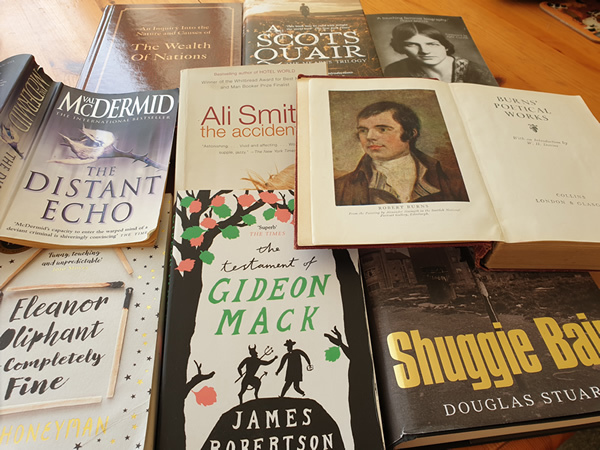 Some of the wealth of Scotland’s great literature.
Some of the wealth of Scotland’s great literature.
Our children need to be taught that we are a nation with much to be proud of. We have sent the best of engineers, doctors, and translators all over the world. Our poets and folk musicians influenced Bob Dylan and linked with American black music to develop Country and other musical genres.2See, among others, the work of Yale Professor Willie Ruff.
How dare anyone suggest that we are too poor, too wee or too stupid to make a go of things independently. We have fantastic natural and human resources with which to build our future. And we will learn from the mistakes of the past to organise ourselves in such a way that we harness those in ways that are thoughtful, sustainable, and fair.
We are not angels. On more than one occasion we marched into England to claim what was not ours.3England, more often, marched against us. Our disgraceful behaviour in Atlantic chattel slavery is something that we will need to come to terms with. And the widespread clearance of our people from our shores is not something only done by absentee English landlords. We cannot claim to be unmitigated martyrs and pure victims of oppression. But this is the twenty-first century and there is a new consciousness about how to be a grown-up player in a globalised world. The current Westminster government shows every sign of clinging on to a redundant imperial attitude and a disdain for common decency. We hang on their coat tails at our peril. All the signs are that Scotland does not buy into that way of thinking and that we want to build a future that is fair, honest, and compassionate. Though even if Westminster was led by decent folk, it would still have no business intruding on our affairs.
Some of them may not see it this way, but the English too, stand to benefit from loosening up the fake contraption that is the United Kingdom. Having the space to explore what John Bull really stands for and to rethink how England can develop in the post-imperial age should be welcomed as a blessing.4
Onward!
How might we envision the future for Scotland? Speculating about the future is usually a fool’s errand. But what we can, with some degree of justification, say, is that Independence is likely to give a huge boost to our confidence in ourselves and in our nationhood.
That sense that we are ‘a nation again’ will tug at the heartstrings of even the most jaded fence-sitter. Even some of those with unionist leanings now, will be hard pressed not to celebrate the uplifting joy of a nation once again free to determine its own future. And at the end of the day, most Tory unionists are shameless opportunists. When they see what way the wind is blowing, they will do what they always do, throw their lot in with independence and follow wherever a potential fast buck takes them.
I am not suggesting that Scotland would wake up the morning after Independence is re-established to an unmitigated paradise. There will be many problems to work through and do that, we will. Because we have that will. We will have the biggest party ever and that will be followed by two monumental hangovers. Wan fae the drink and another fae the 300 years of wilful neglect and pillage by our Southern ex. But, oh, that party will be worth it. And that second hangover will be cured by the optimism and renewed energy of having our country back and steered forward, as it should be, by the people of Scotland.
 You are invited to the party for an Independent Scotland
You are invited to the party for an Independent Scotland
Slàinte mhath.
Notes
1 With apologies to the First Nations who were often trodden upon in the process..
2 See, among others, the work of Yale Professor Willie Ruff. .
3 England, more often, marched against us..
4


